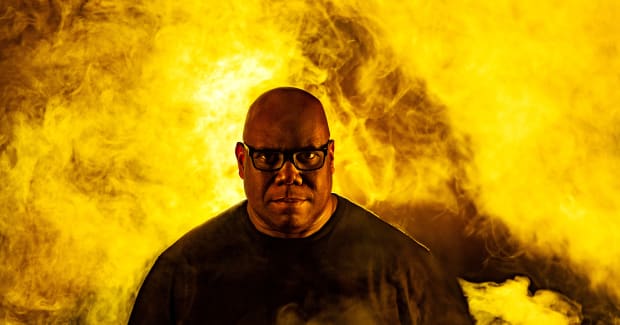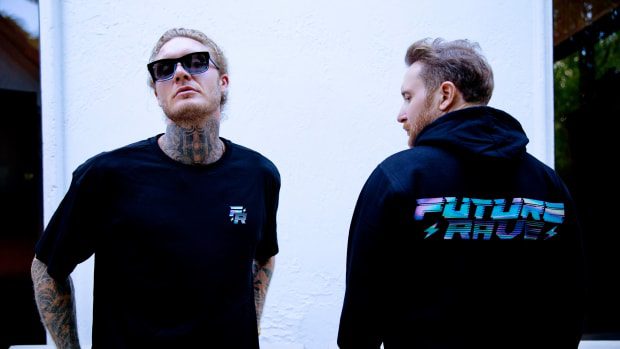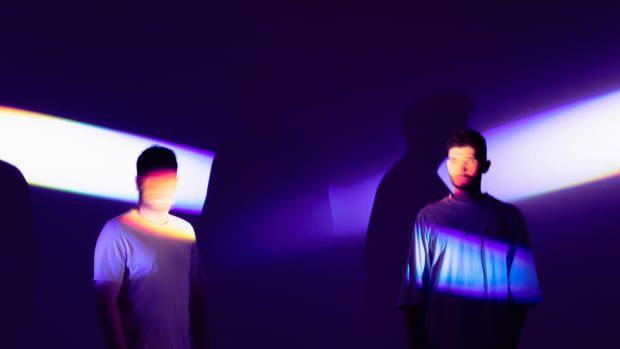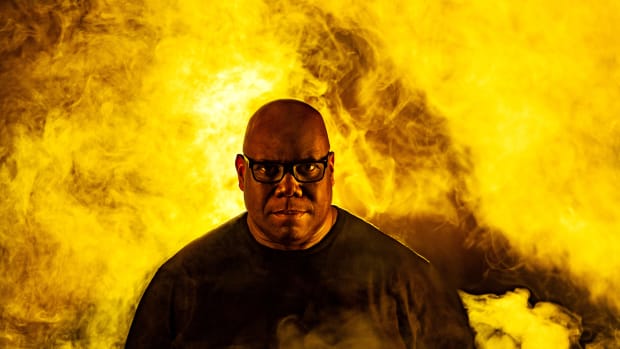Mistakes are like scars. They're permanent, but precious if you're able to find the beauty in them.
Perhaps no one relates more than Carl Cox, one of the most iconic artists in electronic music history, who is tearing hell-for-leather into a creative reawakening he tells us was ignited by a serendipitous string of "mistakes and happy accidents." The byproduct is Electronic Generations, his first album in a decade—and his best yet.
On a rare rainy, dreary morning in Los Angeles when my fresh coffee tasted blander than usual, Cox is patching in from the radiant Spanish city of Torremolinos, where he's relaxing before a performance in a small ballroom. He'll be going live there, almost like a warmup for his sold-out show at Wembley Arena a few days later. Of course, with Carl there's no such thing as a warmup gig—every performance is a masterclass in dancefloor control for the "King of Techno."
"I love small parties," Cox says. "The money that I get from small parties is nothing, but I love it because it grounds me. It's where I came from. For me, you have to do the small ones to basically understand where you are as an artist today."
But who exactly is Carl Cox today, aside from your favorite DJ's favorite DJ?
"I’m not DJ Carl Cox anymore. I'm Carl Cox, the artist."
He's a man possessed, someone you wouldn't recognize. Not in the superficial way—Cox is still the same gregarious and effervescent techno teddy bear—but in terms of his artistry. In that regard, he's as different as the weather in Spain and California on the morning we spoke.
It's not that Cox went away and returned anew. The world's preeminent techno artist never left, remaining as prolific as ever even through the pandemic, performing 52 virtual "Cabin Fever" shows when people needed to dance more than ever. He headlined Glastonbury, where he threw down an epic set alongside Chase & Status. And he debuted his extraordinary "Hybrid Live" show at this year's Ultra Music Festival, where he poured gasoline on the flame of his reputation as a persevering pioneer, which has never even flickered.
That reputation is reflected in Electronic Generations, which releases on December 2nd. What makes the album so special, however, is the fact that it shows a side of Cox which his fans have never heard.
Electronic Generations is Cox's first-ever body of work as a live artist. The album, which he equates to "a true electronic music experience," is a microcosm of a latent dream that had been dormant for over 40 years. It's the culmination of his push to rupture the inextricable link between his DJing and his original music.
"I've always wanted to go out as a live entity, outside of DJing," Cox explains. "I’m not DJ Carl Cox anymore. I'm Carl Cox, the artist. And this album is only the beginning of what I do next."
It all started after the onset of COVID-19. It'd been years since the legendary DJ experienced a semblance of stillness in life and he grew lonely, the exuberant camaraderie of rave culture replaced by a general air of malaise. He'd also tragically lost both his mother and father, who died following bouts with septicemia and dementia, respectively.
Just like the rest of us who became tethered to our devices during those despondent days, Cox spent his time "talking to machines."
But his machines were a little different. Cox had spent three years building a hi-tech recording studio on a farm in Melbourne, eventually settling into a bleeding edge bolt-hole where he says he could make music for the rest of his life.
A blasé Cox quickly found himself toiling through periods of stagnation, the kind that wallops you after years of vestigial wear-and-tear. He became disillusioned after releasing four albums, and he'd had enough.
"At the end of the day, it's just electronic music… It's the millions of people all around the world going out and listening to the art of the kick drum. So it depends what comes after the kick drum which defines the music. And I said to myself, 'I think I've done enough.'"
With nothing but time on his hands—the fingertips of which could tell the most remarkable DJing stories if only their nails could speak—Cox began to play around with the equipment in his studio. Drum machines, modular synthesizers, samplers, loop stations, Moogs—the list goes on. He dove into his arsenal of gear like a golden retriever after discovering a pile of autumn leaves.
Cox says it wasn't long before he got into a groove, fluidly using each machine in unison and creating live electronic music for the first time.
His mind became a tabula rasa. Yes, we all wish we could have a blank slate amidst the vicious throes of burnout, but that can only happen once we've put in the work. It's only natural to become jaded after decades of flying the flag of underground techno.
"My energy and my soul came back into something which had been missing for so many years," Cox rhapsodizes. "There was a spark here of something which I've ignited."
After an hour and a half of flinging headlong into this live music continuum, he had laid down roughly a dozen demos, which he says he'd never done before. It was poetry in motion.
"This was what was so exciting for me because I'm finding myself now making music without even thinking about making music. Because that’s what's been suppressed for so long," adds Cox, who says he "captured a moment" in the recording process of Electronic Generations that can only be heard in the finished product.
It's not easy working with gear like modular synthesizers, which are considered a lost art in today's music production community thanks to a surfeit of software and digital plugins. Cox pauses and leaves my frame for a moment before returning with a Pulsar-23 from Soma Laboratory, which looks more like a control deck on Han Solo's Millennium Falcon.
"This is one crazy ass machine," he says of the semi-modular drum machine, a gift from Joseph Capriati.
Cox also praises Pioneer DJ's DJM-V10 mixer, a "game-changer" because of its capability to record each channel live and print the resulting waveforms—mistakes and all—directly into his digital audio workstation, Ableton. His project files became the stuff of Jackson Pollock paintings, canvases full of chaotic musical brushstrokes which form a cohesive work of art when manipulated by the right craftsman.
Eventually he had written 20 ideas for new songs and had to stop for his own good. He was like a can of soda—too much action on the inside and it'll explode.
From there, Cox found himself at a crossroads. It seems the impact of COVID-19 deeply affected him, the scourge of the virus lighting the match of a samsara.
"I thought, 'If we get out of this pandemic, I don’t really want to come back as a DJ,'" he explains. "I want to come back and give you more, give you something else that I wasn’t thinking about doing."
Cox first tested his new music and direction in November 2020, when he recorded a live set for "Movement Selects," a virtual performance series launched by the organizers of Detroit's fabled Movement festival. Using a Moog module, DJM-V10 and more, Cox says he played an arcane set replete with "undefined" original music no one had ever heard. The only machine that couldn't talk that day? Shazam.
"I can’t suppress this music. It has to go somewhere."
For many fans, watching Cox perform an improvised show was like a baby seeing a mirror for the first time.
"They loved it," he gushes. "They were blown away."
Recommended Articles
"A New Chapter for Future Rave": David Guetta and MORTEN Drop Long-Awaited EP, "Episode 2"
The pioneers of the future rave genre are reinforcing its roots with their inventive new EP.
EDM.com Presents: The House Brew, Vol. 14
Adriatique, Atish, Chloé Caillet and more feature in the October 2022 edition of The House Brew.
40 Years Later, Carl Cox Is Just Getting Started
"I'm not DJ Carl Cox anymore. I’m Carl Cox, the artist. And this album is only the beginning of what I do next."
So Cox decided to approach a few record companies. He wasn't itching to release the music on a major label, instead tentatively pursuing a "renegade" release plan via his own Awesome Soundwave imprint.
"'I can’t suppress this music,'" he remembers thinking at the time. "'It has to go somewhere.'"
An exec at BMG agreed. In fact, he said Electronic Generations is the best music Cox had ever made.
A nostalgic Cox brings up "I Want You (Forever)," the first record he ever produced. He released the track on Paul Oakenfold's Perfecto Records—a subsidiary of BMG—in 1991, only to be re-signed by the iconic music company over 30 years later. Never loquacious, he's now at a loss for words. His humility and appreciation for this "unreal" full-circle moment are palpable.
"I Want You (Forever)" is a relic of a bygone era, but all it takes is one spin for that vintage breakbeat serotonin rush to wash over and send shivers to your toes.
Things have changed dramatically since then, especially the life of a traveling DJ. Back when Cox started out, today's level of fame didn’t even exist for DJs, who toiled through an endless loop of underground raves and house parties. Cox cut his teeth in that DIY concrete jungle in the early '80s, when promoters didn’t want to pay DJs well because of their perceived lack of ability to sell tickets and fill out venues.
But by 1988, he was getting booked all around the U.K. and started to travel heavily, at one point "just going mad" after racking up 120,000 miles on his car in a single year. And as his fame grew, the same promoters started to plaster his name on their rave flyers.
With the help of his then-girlfriend, Cox began to send a contract to promoters that stated he'd perform for a price and timeframe he determined, a move he says no other DJs made at that time. If the promoter didn’t sign the agreement and send half the money upfront, he'd simply move on.
Electronic Generations pays homage to that influential work, and to the ensuing paradigm shift it helped trigger. It's a snapshot of that serpentine journey, which culminated in a world where DJs can perform for the kinds of crowds that only rockers and pop stars had seen.
“When I did that—probably in 1990—is the time that I knew there was a shift with DJs becoming a commodity based on business," Cox explains. "It took a while to get people to take DJs seriously, as performing artists. And as you can see, we are in a big, responsible position now, to be able to basically turn up and stand in front of all these thousands of people who have paid money to see us perform."
Now, as Cox ascends on his new flight path, he knows there may be birds flying into the propellers. He admits that techno traditionalists may lash out after hearing Electronic Generations. After all, the decision to throw a wrench into such a time-tested career is as daring as it is dicey.
"My album doesn’t conform to anything," Cox asserts. "I’m not going to apologize that it’s too hard. I’m not going to apologize it’s got no vocals in… It doesn’t matter. It’s the way it went down is what that core energy is all about. And I really enjoy the fact that it doesn’t sit well with most people."
After four galvanizing decades of making people dance, it was time to do something for himself.
"I never made [Electronic Generations] for any reason, apart from my reason," Cox continues. "My reason is that this is the embodiment of what got me into techno music in the first place. The way how this music was made. Most of the records that you’re hearing are made for a purpose: 'This record will work on the dancefloor.' So you make and formulate it to do just that. I just can’t do that."
Cox believes his longtime fans—many of whom have stuck with him since the early '80s—can see a future in his new music and can readily understand his reasons for creating it. But the younger generation is another story.
When Cox released his memoir, Oh Yes, Oh Yes!, a slew of media outlets ran lurid, catchpenny headlines alluding to its most dramatic stories, like when gang members opened fire during one of his DJ sets. They largely ignored the one constant that has led him to become the apotheosis of techno: his music (duh). And if there's anyone to usher in a new era of the genre for today's young ravers, it's him.
"They don’t know what they’re looking for unless they’re exposed to it," Cox explains. "I think—more than anything—my life performances as a DJ and the tracks that I choose to play have all been about education. I will get someone who has no idea about the techno sound and present what I believe is techno of old and new."
The "techno of new" is experiencing quite a moment thanks to DJs like Charlotte de Witte and Amelie Lens, who Cox recognizes as today's preeminent artists. Beloved for their ferocious approach to the genre, they've been booked to perform at practically every major electronic music festival in the world, slamming tracks at a breakneck 140 beats per minute.
That acid-fueled sound isn't new to Cox. He rinsed it a lot, he says, about 20 years ago. But things have changed.
"It has that energy but it doesn’t have a soul to it," Cox says. "Because there's nothing soulful about electronic music when it’s coming at you that hard… [Electronic Generations] is techno, but it’s not strictly techno in the end of the day. If I was doing strictly techno, every record would sound the same—militant, straight-up and then you dance into the next one. I can't do that."
It’s important to note that Cox doesn't fault Lens, de Witte and his many other techno contemporaries, who are simply creating and sharing the music they love. But fans are mercurial and move onto new things quickly, he cautions, so it's important to be agile when pursuing a career as unpredictable as that of a DJ. It’s one of the key ingredients of the secret sauce behind his unbelievable longevity in the tortuous world of electronic dance music.
"If you listen to any of the albums I’ve made before, this is something else."
"It’s alright having that energy today, but there has to be a tomorrow," Cox adds. “And my journey has been all about tomorrow, based on why I’m still here and why I’m still relevant in such a way. Because people know from a historic point of view that I’ve been through everything. Why would I now—20 years later—play the same music that I played 20 years ago? I wouldn’t have progressed."
This brings up a simple yet contentious question. What even is techno nowadays?
Is it defined by the distorted kicks of hard dance? The frenetic cadence of gabber? "People see that as techno," explains Cox, who says he used to play out that kind of music back in the day as well. But it gave him headaches and became "soulless."
"Why would I play that music at the end of the day, when I want to give the premise of what I know is 'the' sound of what techno music is all about?" asks Cox. "So my album is a little bit of a window or showcase of what the sound of techno is from today’s point of view. And from my point of view, this is my offering."
Ultimately Cox believes Electronic Generations, which features pre-mixes from the likes of Fatboy Slim, Nicole Moudaber, Franky Wah, Riton and Juan Atkins, will live up to its name and influence the techno lineage for years to come. The album will act like a lightning rod to his critics' emotional electricity at first, but he says it'll eventually serve as "the sound of tomorrow."
"If you listen to any of the albums I’ve made before, this is something else," explains Cox, who could only stop waxing poetic about his new music if you muzzled him. "This is completely cutting-edge compared to everything that I’ve created and what I’ve done, to the point that the album has led me towards doing a live electronic show at Wembley Arena."
Cox's historic performance at the famed Wembley Arena is quite an anomaly when thinking back to his isolation in the Land Down Under. At that time, he'd been aimlessly messing around with machines, making beats which had a snowball's chance in hell of escaping the four walls of his studio.
Fast-forward to 2022, when that music is rattling the very bones of Wembley, one of London's most beloved arenas. It's so wonderfully frightening to think how much can change in two years, let alone 40.
The real scary part? Cox maintains that he's only just scratching the surface. He says he hasn’t experimented with his gear as much as he'd like to and believes he can come up with even better music if he takes time to unlock his full potential.
Even at his age, Cox believes there's no limit to how far he can go. His fans can kind find solace in the notion that he's only getting started at the age of 60—and he's not going anywhere.
"I'm always here. I’m always around," Cox says with a chuckle. "Uncle Carl still plays the music that you can get behind."










